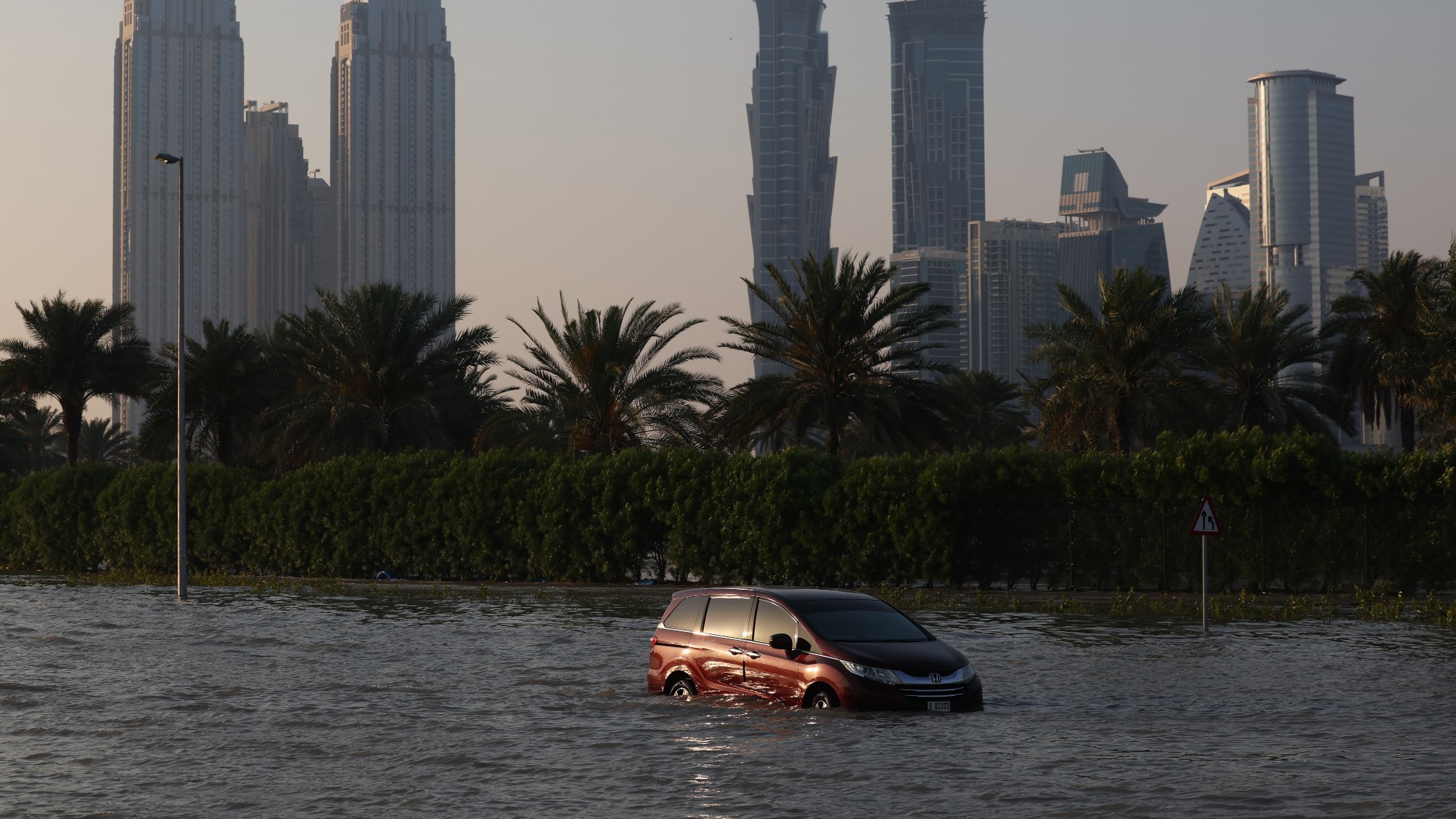What is cloud seeding and did it cause Dubai's severe rainfall?
The future is flooded


A free daily email with the biggest news stories of the day – and the best features from TheWeek.com
You are now subscribed
Your newsletter sign-up was successful
The Persian Gulf was recently hit with a year's worth of rain in the span of two days, causing extensive flooding. Some have speculated that the United Arab Emirates' (UAE) attempt at cloud seeding, a method of manipulating clouds to produce more rain, is responsible for the torrential downpour. While scientists have said that geoengineering was not the cause this time, the extreme rain has raised concerns about the technique and whether natural processes like rainfall should be manipulated at all.
What is cloud seeding?
Cloud seeding is a "weather modification concept that attempts to draw more rain or snow out of a cloud than would occur naturally," said CNN. "This can be done by using aircraft to drop small particles (like silver iodide) into clouds," the BBC said. "Water vapor can then condense more easily and turn into rain." The idea was conceived to increase rainfall in especially arid regions like deserts, and the UAE has used the technique for decades.
Cloud seeding is "generally deployed when conditions of wind, moisture and dust are insufficient to lead to rain," said the BBC. It has been used in places all over the world, including the U.S. While some data has shown signs that cloud seeding could increase precipitation and snowpack, there has not been enough research done to determine how effective the method truly is. In fact, it may actually make some regions drier. "It is possible that you're actually stealing water from someone else when you do (cloud seeding), because it may be, at least on a regional basis, a zero-sum game where if water falls out of the cloud in one spot, it's even drier by the time it makes it downwind to the next watershed," Daniel Swain, a climate scientist at UCLA, said to CNN.
The Week
Escape your echo chamber. Get the facts behind the news, plus analysis from multiple perspectives.

Sign up for The Week's Free Newsletters
From our morning news briefing to a weekly Good News Newsletter, get the best of The Week delivered directly to your inbox.
From our morning news briefing to a weekly Good News Newsletter, get the best of The Week delivered directly to your inbox.
Can it cause severe flooding?
Scientists do not attribute Dubai's extensive flooding and rainfall to cloud seeding, especially because of the lack of controlled studies to test. "Even if cloud seeding did occur, it would take sophisticated research to determine whether it increased the rainfall — something that has proved difficult in past scientific inquiry," said The Washington Post. "How do you know how much precipitation that might actually end up falling from that cloud occurred due to the seeding? Or how much would have fallen without the seeding?" Swain said. "This isn't a setting where you can do a truly controlled experiment."
Instead, experts attribute the rainfall to a "large, slow-moving storm that traversed the Arabian Peninsula and tracked into the Gulf of Oman over the course of multiple days," CNN said. "When such intense and large scale systems are forecasted, cloud seeding — which is a costly process — is not performed because [there is] no need to seed such strong systems of regional scale," Diana Francis, the head of the environmental and geophysical sciences at Khalifa University in Abu Dhabi, said to the BBC. Also, while cloud seeding could potentially increase precipitation, "the atmosphere would have likely been carrying more water to form clouds in the first place, because of climate change," Friederike Otto, a climate scientist at Imperial College London, said to the Post.
Increasingly severe storms will become the norm as climate change continues to worsen. "There need to be strategies and adaptation measures to [adapt to] this new reality [of more frequent and intense rainfall]," said Francis. "For example, the infrastructure of roads and facilities need to be adapted, building reservoirs to store water from spring rain and use it later in the year."
A free daily email with the biggest news stories of the day – and the best features from TheWeek.com
Devika Rao has worked as a staff writer at The Week since 2022, covering science, the environment, climate and business. She previously worked as a policy associate for a nonprofit organization advocating for environmental action from a business perspective.
-
 What is the endgame in the DHS shutdown?
What is the endgame in the DHS shutdown?Today’s Big Question Democrats want to rein in ICE’s immigration crackdown
-
 ‘Poor time management isn’t just an inconvenience’
‘Poor time management isn’t just an inconvenience’Instant Opinion Opinion, comment and editorials of the day
-
 Bad Bunny’s Super Bowl: A win for unity
Bad Bunny’s Super Bowl: A win for unityFeature The global superstar's halftime show was a celebration for everyone to enjoy
-
 The environmental cost of GLP-1s
The environmental cost of GLP-1sThe explainer Producing the drugs is a dirty process
-
 The plan to wall off the ‘Doomsday’ glacier
The plan to wall off the ‘Doomsday’ glacierUnder the Radar Massive barrier could ‘slow the rate of ice loss’ from Thwaites Glacier, whose total collapse would have devastating consequences
-
 Can the UK take any more rain?
Can the UK take any more rain?Today’s Big Question An Atlantic jet stream is ‘stuck’ over British skies, leading to ‘biblical’ downpours and more than 40 consecutive days of rain in some areas
-
 As temperatures rise, US incomes fall
As temperatures rise, US incomes fallUnder the radar Elevated temperatures are capable of affecting the entire economy
-
 The world is entering an ‘era of water bankruptcy’
The world is entering an ‘era of water bankruptcy’The explainer Water might soon be more valuable than gold
-
 Climate change could lead to a reptile ‘sexpocalypse’
Climate change could lead to a reptile ‘sexpocalypse’Under the radar The gender gap has hit the animal kingdom
-
 The former largest iceberg is turning blue. It’s a bad sign.
The former largest iceberg is turning blue. It’s a bad sign.Under the radar It is quickly melting away
-
 Why the Middle East is obsessed with falcons
Why the Middle East is obsessed with falconsUnder the Radar Popularity of the birds of prey has been ‘soaring’ despite doubts over the legality of sourcing and concerns for animal welfare
